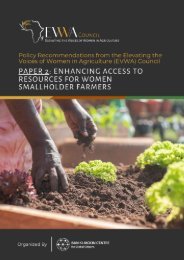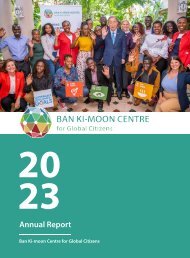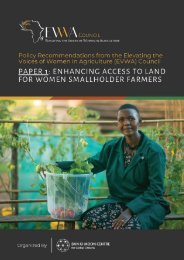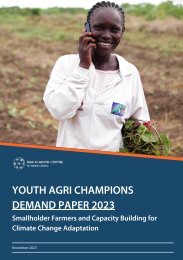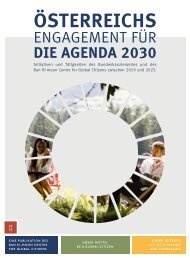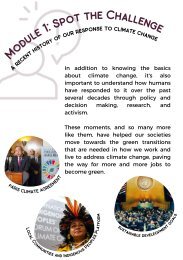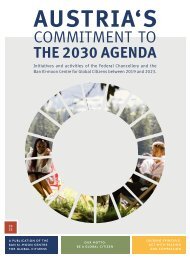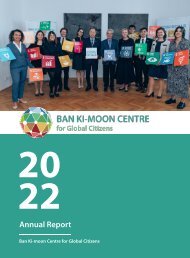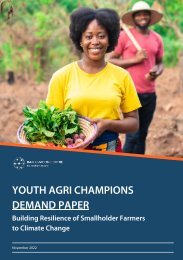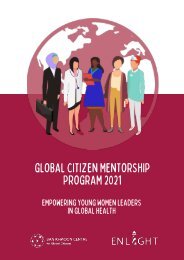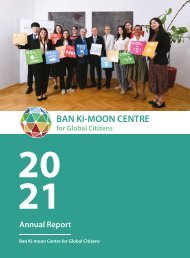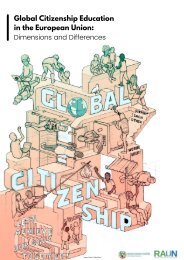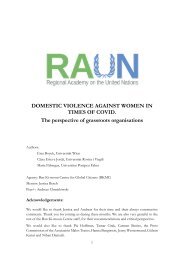Summary Brief - Voices of Hope Realities of Afghan Women
pon initiative by the Global Citizen Afghan fellows, the Ban Ki-moon Centre hosted a virtual roundtable entitled “Voices of Hope: Realities of Afghan Women” on 25 May 2022.
pon initiative by the Global Citizen Afghan fellows, the Ban Ki-moon Centre hosted a virtual roundtable entitled “Voices of Hope: Realities of Afghan Women” on 25 May 2022.
You also want an ePaper? Increase the reach of your titles
YUMPU automatically turns print PDFs into web optimized ePapers that Google loves.
VOICES OF HOPE<br />
<strong>Realities</strong> <strong>of</strong> <strong>Afghan</strong> <strong>Women</strong><br />
25 MAY 2022<br />
ONLINE ROUNDTABLE<br />
SUMMARY BRIEF
What has changed<br />
since August 2021?<br />
<strong>Afghan</strong>istan is experiencing a humanitarian<br />
crisis:<br />
food insecurity and malnutrition<br />
high living costs and unemployment<br />
resulting in national poverty<br />
large numbers <strong>of</strong> refugees and internally<br />
displaced people.<br />
pon initiative by its <strong>Afghan</strong><br />
Global Citizen fellows, the<br />
Ban Ki-moon Centre hosted a<br />
virtual roundtable entitled<br />
“<strong>Voices</strong> <strong>of</strong> <strong>Hope</strong>: <strong>Realities</strong> <strong>of</strong><br />
<strong>Afghan</strong> <strong>Women</strong>” on 25 May<br />
U2022.<br />
The goal <strong>of</strong> the event was to highlight the<br />
activism <strong>of</strong> <strong>Afghan</strong> women on the ground as<br />
well as the diaspora and create a platform to<br />
discuss the international community’s<br />
challenges and recommendations for increased<br />
solidarity and effective action.<br />
International Gender Champions Her Excellency<br />
Manizha Bakhtari, Ambassador <strong>of</strong> <strong>Afghan</strong>istan<br />
to Vienna, and BKMC CEO Monika Fröhler<br />
spotlighted <strong>Afghan</strong> women as resilient and<br />
active agents <strong>of</strong> change fighting for sustainable<br />
peace. Both iterated the risks to civil society<br />
leaders, activists, and reporters, especially<br />
women, and their shrinking involvement in<br />
public life due to the Taliban’s fundamentalist<br />
hardliner policies. Their resistance is moving<br />
more and more <strong>of</strong>f the streets and onto social<br />
media and smaller underground movements.<br />
This crisis and oppression <strong>of</strong> human rights are<br />
particularly hitting women and girls:<br />
increase <strong>of</strong> violence against women<br />
child marriage<br />
postponement <strong>of</strong> secondary school for<br />
<strong>Afghan</strong> girls<br />
exclusion <strong>of</strong> women from decision-making<br />
and executive roles<br />
restricted and segregated movement<br />
poor access to healthcare services<br />
strict Islamic laws in all areas <strong>of</strong> public and<br />
private life<br />
<strong>Women</strong>’s movements like the <strong>Afghan</strong> <strong>Women</strong>'s<br />
Unity and Solidarity Team formed after the<br />
Taliban takeover in the summer <strong>of</strong> last year, but<br />
their protests have been regularly put down<br />
and the leaders arrested and/or abducted.<br />
Knowing the risks, these brave women do not<br />
give in and continue defending their rights and<br />
occupying the streets. They do not let their<br />
voices be silenced.<br />
Especially in the areas <strong>of</strong> politics, education,<br />
culture, work and activism – and this should<br />
give us hope.<br />
1
With their knowledge and independence<br />
gained over the last 20 years, <strong>Afghan</strong> women<br />
are increasingly trying to transform the system<br />
they are living in and resisting the Taliban’s<br />
oppression. They also deeply question the<br />
international community’s silence and<br />
condemn global misbelief in a new and more<br />
liberal Taliban regime.<br />
Increased solidarity - from the diaspora and<br />
local civil society, from both women AND men -<br />
is needed to strengthen the opposition<br />
movement fighting for democracy, human<br />
rights and peace.<br />
Despite the awareness <strong>of</strong> the country’s and<br />
especially local women’s dire situation, the<br />
international community still fails to meet the<br />
real necessities. The following challenges and<br />
limitations have been identified by our<br />
speakers:<br />
1- Lack <strong>of</strong> proper coordination,<br />
monitoring and evaluation mechanisms<br />
for international engagement with the<br />
Taliban (condition-based/accountability<br />
method with emphasis on women's and<br />
girls’ education, protection and political<br />
participation)<br />
2- Lack <strong>of</strong> clear policies within the donor<br />
landscape to match commitments with<br />
real financing, especially financing for<br />
grassroots feminist initiatives on the<br />
ground<br />
3- Lack <strong>of</strong> sustainability and economic<br />
opportunity in program design to avoid<br />
aid dependency and short-term<br />
interventions<br />
4- Lack <strong>of</strong> gender mainstreaming in the<br />
development <strong>of</strong> humanitarian assistance<br />
programs and evaluation<br />
5- Lack <strong>of</strong> protection mechanisms for<br />
<strong>Afghan</strong> women’s movements and<br />
activists<br />
6- Absence <strong>of</strong> targeted funding streams<br />
to support women’s organizations in<br />
<strong>Afghan</strong>istan<br />
7- Absence <strong>of</strong> unity and coherence in the<br />
networks <strong>of</strong> <strong>Afghan</strong> human rights activists<br />
in the country and abroad<br />
8- High administrative costs during grant<br />
allocation processes for humanitarian<br />
programs as well as taxation from the<br />
Taliban for local NGOs<br />
9- Lack <strong>of</strong> male solidarity and funding for<br />
women’s led organizations supporting<br />
the most vulnerable in <strong>Afghan</strong>istan<br />
10- Lack <strong>of</strong> united monitoring system<br />
within the donor community, ensuring<br />
equitable distributions to women and<br />
minorities<br />
11- Lack <strong>of</strong> centralized government in the<br />
country and fractured Taliban group<br />
12- Lack <strong>of</strong> countries’ individual<br />
assessments and strategies (instead, still<br />
following US policies)<br />
13- Continued misbelief that the Taliban<br />
have become more liberal and want to<br />
uphold women’s rights<br />
2
The audience was actively engaged in the<br />
discussion and shared further insights into the<br />
current state <strong>of</strong> <strong>Afghan</strong>istan on the ground.<br />
Read one <strong>of</strong> the participants’ demands here.<br />
Speakers<br />
Hooria Sardar<br />
Global Citizen Fellow and <strong>Women</strong>'s rights activist<br />
H.E. Manizha Bakhtari<br />
Ambassador Extraordinary and Plenipotentiary <strong>of</strong><br />
the Islamic Republic <strong>of</strong> <strong>Afghan</strong>istan<br />
Dr Zahra Muhammadi<br />
Dentist and women's rights activist<br />
“The spirit <strong>of</strong> <strong>Afghan</strong> women<br />
will never die”<br />
H.E. Manizha Bakhtari<br />
Marufa Shinware<br />
Executive Director at Immigrant Culture and Art<br />
Association<br />
Monika Froehler<br />
CEO, Ban Ki-moon Centre for Global Citizens<br />
All in all, the international community must<br />
stop normalizing the devastating situation in<br />
<strong>Afghan</strong>istan and the de-facto rule <strong>of</strong> the<br />
Taliban. We should not stop having<br />
conversations about human rights abuses and<br />
the humanitarian crisis in the country, focusing<br />
especially on women and girls. International<br />
feminist organizations should forge stronger<br />
alliances with the <strong>Afghan</strong> diaspora in support <strong>of</strong><br />
those still fighting on the ground. More<br />
targeted action is needed to create one unified<br />
movement because <strong>Afghan</strong> women keep<br />
risking their lives by protesting for their basic<br />
human rights.<br />
3




